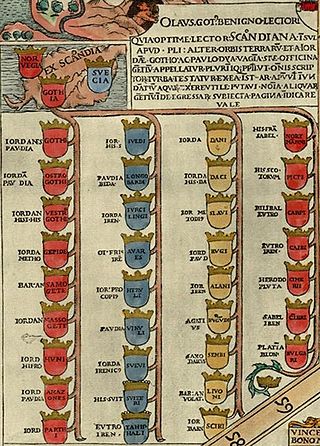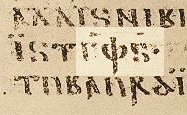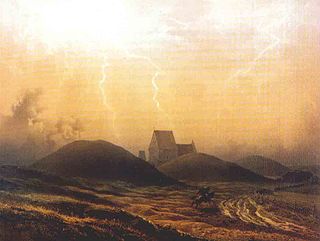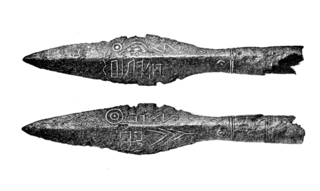
Sceafa was an ancient Lombardic king in English legend. According to his story, Sceafa appeared mysteriously as a child, coming out of the sea in an empty skiff. The name also appears in the corrupt forms Seskef, Stefius, Strephius, and Stresaeus. Though the name has historically been modernized Shava, J.R.R. Tolkien used the correctly constructed modern English spelling Sheave.

The Geats, sometimes called Goths, were a large North Germanic tribe who inhabited Götaland in modern southern Sweden from antiquity until the late Middle Ages. They are one of the progenitor groups of modern Swedes, along with Swedes and Gutes. The name of the Geats also lives on in the Swedish provinces of Västergötland and Östergötland, the Western and Eastern lands of the Geats, and in many other toponyms.

The Swedes (probably from the PIE reflexive pronominal root *s e, "one's own [tribesmen/kinsmen]"; Old English: Swēon) were a North Germanic tribe who inhabited Svealand in central Sweden and one of the progenitor groups of modern Swedes, along with Geats and Gutes. They had their tribal centre in Gamla Uppsala.

Götaland is one of three lands of Sweden and comprises ten provinces. Geographically it is located in the south of Sweden, bounded to the north by Svealand, with the deep woods of Tiveden, Tylöskog and Kolmården marking the border.

Old Norse Yngvi[ˈyŋɡwe], Old High German Ing/Ingwi and Old English Ing are names that relate to a theonym which appears to have been the older name for the god Freyr. Proto-Germanic *Ingwaz was the legendary ancestor of the Ingaevones, or more accurately Ingvaeones, and is also the reconstructed name of the Elder Futhark rune ᛜ and Anglo-Saxon rune ᛝ, representing ŋ.
The Götaland theory is a view which challenges established history and archaeology, and claims that the foundation of Sweden occurred not in Eastern Sweden, but in the province of Westrogothia (Västergötland). The adherents of this idea use wide-ranging methods from controversial ones, such as dowsing and asking mediums to contact the dead, to more conventional methods such as etymology, but also claim that the established academic material consists of lies and forgeries. Although well known in Sweden and fervently preached by its adherents, it has never been accepted by scholars.
Onela was according to Beowulf a Swedish king, the son of Ongentheow and the brother of Ohthere. He usurped the Swedish throne, but was killed by his nephew Eadgils, who won by hiring foreign assistance.
Various gods and men appear as sons of Odin or sons of Wodan/Wotan/Woden in old Old Norse and Old High German and Old English texts.

Geatish kings, ruling over the provinces of Götaland (Gautland/Geatland), appear in several sources for early Swedish history. Today, most of them are not considered historical.
Gautrekr was a legendary Geatish king who appears in several sources, such as Gautreks saga, Hrólfs saga Gautrekssonar, Bósa saga ok Herrauðs, Ynglinga saga, Nafnaþulur and Af Upplendinga konungum.

The Gutes were a North Germanic tribe inhabiting the island of Gotland. The ethnonym is related to that of the Goths (Gutans), and both names were originally Proto-Germanic *Gutaniz. Their language is called Gutnish (gutniska). They are one of the progenitor groups of modern Swedes, along with historical Swedes and Geats.

Gutasaga (Gutasagan) is a saga regarding the history of Gotland before its Christianization. It was recorded in the 13th century and survives in only a single manuscript, the Codex Holm. B 64, dating to c. 1350, kept at the National Library of Sweden in Stockholm together with the Gutalag, the legal code of Gotland. It was written in the Old Gutnish language, a variety of Old Norse.

Gothicism or Gothism was a cultural movement in Sweden, centered on the belief in the glory of the Swedish Geats, who were identified with the Goths. The founders of the movement were Nicolaus Ragvaldi and the brothers Johannes and Olaus Magnus. The belief continued to hold power in the 17th century, when Sweden was a great power following the Thirty Years' War, but lost most of its sway in the 18th. It was renewed by the Viking revival and Romantic nationalism in the early 19th century, this time with the Vikings as heroic figures.

The English word god comes from the Old English god, which itself is derived from the Proto-Germanic *ǥuđán. Its cognates in other Germanic languages include guþ, gudis, guð, god, and got.

Angul or Angull was a legendary Norse king who, according to the Gesta Danorum, was the ancestor of the Angles in Denmark. His father was King Humbli, probably the same as Heimdall, one of Woden's twelve diar in Sigtuna and Gamla Uppsala in Sweden.

Gothic paganism was the original religion of the Goths before their conversion to Christianity.

The name of the Goths is one of the most discussed topics in Germanic philology. It is first recorded by Greco-Roman writers in the 3rd century AD, although names that are probably related appear earlier. Derived from Proto-Germanic *Gutōz ~ *Gutaniz, it is closely related to and probably means the same as the names of both the Geats of southern Sweden and Gutes of Gotland. The implications of these similarities, and the actual meaning of the Gothic name, are disputed in scholarship. Although the Goths have disappeared as a people, their name has survived in various appellations up to the present day.
Gaute is a Norwegian masculine given name derived from the Old Norse Gauti, which is formed by the word gautr, i.e. "man from Götaland (Gautaland) in Sweden" or, even earlier, "Goths". In 2016, 1997 people used the name in Norway and is currently ranked #240. In Sweden the versions Göte or Göthe, in Iceland Gauti or Gautur and in Finland Göte is used as the given name equivalent.











